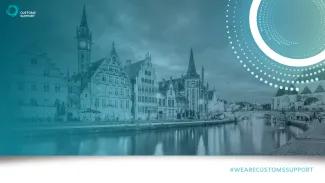The Port of Ghent
The Port of Ghent is part of the North Sea Port, which spans more than 60 kilometres across the coast of Belgium and the Netherlands. Alongside the Port of Ghent, other notable areas within the North Sea Port are the ports of Terneuzen and Vlissingen.
In 2022, the North Sea Port transhipped more than 73 million tonnes of cargo to and from sea-going vessels, and over 64 million tonnes by inland vessels.
The history of Ghent
Due to its location on the Scheldt and Leie Rivers, Ghent has been a key location for waterway trade since the Middle Ages – although there is evidence of human occupation from as early as the Stone and Iron Ages. Protected by the Gravensteen Castle in the city since the 12th century, Ghent was mostly independent.
Alongside Bruges and Ypres, Ghent made the County of Flanders very wealthy during the 12th and 13th centuries – particularly because of the trade of English wool and woolen clothes. In the late 14th century, this relationship with England was so strong that Ghent even sided with the English against the Count of Flanders and the King of France during the 100 Years War.
Trade volumes returned to Ghent after the war, and the city was adopted into the Burgundy Provinces. Following the marriage of Mary of Burgundy, the city passed into the House of Habsburgs in the 15th century.
In 1577, a Calvinist Republic was established in the County of Flanders by radical Protestants – who wanted to overthrow and persecute Catholics in the region. This republic lasted until 1584, when the Spanish laid siege to the city during the 80-Year War.
Ghent lost its independence during this time, as well as its trade. The conflict finally ended in 1648, but it took until the 18th century for Ghent’s textile trade to return to popularity. This was further boosted when the first mechanical weaving machine was introduced to mainland Europe in 1800.
Following the Battle of Waterloo in the 19th century, Ghent became part of The Netherlands for 15 years. During this time, plans to build new canals and expand existing ones were drawn up and began so that waterborne traffic could increase to the area.
20th century occupation and continued expansion
Ghent was occupied during the First and Second World Wars; however, it mostly avoided being destroyed. Local Belgians liberated the city with the help of the British on 6th September 1944.
From 1961 to 2005, more quayside was dug and created which transformed the Port of Ghent into the powerhouse it is today – capable of handling many large vessels and millions of tonnes of cargo per annum.
In 2017, a project began to install a new lock to improve the connection between Ghent and Terneuzen – which is due to conclude in 2024. This project will reduce the bottleneck of vessels between the Western Scheldt and the Ghent-Terneuzen Canal, and has been likened to the expansion project at the Panama Canal.
Customs Support Ghent
There are two Customs Support offices in the Ghent region, overseen by Regional Manager, Hans Jodlowski.
The region’s team has 16 declarants for import clearance and export customs declarations, as well as the compliance and customs consultancy teams who guide our people and customers. True to Ghent’s trading history with England, we also provide end-to-end customs clearance with the UK.
Did you know?
- Ghent’s town motto is “Nie pleuje!”, which means “Don’t give up!”. Although the origin of the slogan is unknown, it is likely from one of the many times the people of Ghent fought for their ideals.
- “The Ghent Festivities” is a 10-day annual festival which attracts over 1,300,000 people every year, and covers approximately 765,000 m2 of the region.
- Over 74,000 students are studying at Ghent University, which is in the top 100 universities worldwide.
Need Customs Support in Ghent?
Working with our colleagues across the EU and UK, Customs Support Ghent makes customs simple for traders moving goods throughout Belgium and Europe. Contact us for more information.















